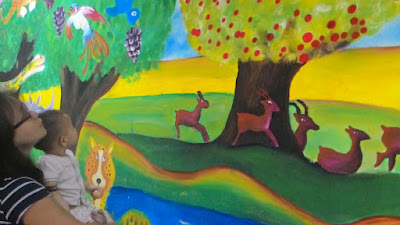June
28, 2015, Sunday
 |
| The small town of Julau stretches from a couple of blocks and houses various business |
 |
| Hung's daughter poses with the noodle-making machine and tools on the upper floor of the shophouse |
JULAU
is a pepper town that spices up over the weekend, and where fumes and dirt
kicked up by cars and bikes rise with the morning sun.
Julau,
although a small town, is packed with history, culture and traditions.
Wandering around the town, we met 64-year-old Ingai Achot who is a retired
teacher and has spent more than 40 years of his life in Julau.
 |
| Hung prepares noodles in the kitchen of the coffeeshop passed down from his father to him |
Ingai,
who currently gives English tuition classes in his spare time, told us Julau
was once home to a mighty Iban warrior named Asun who led the Iban community in
rebelling against the Brookes – the ‘White Rajahs’.
According
to him, the Brooke Fort in Nanga Meluan which is located around 20km from Julau
bazaar was built in 1936 and was used as an administrative centre during the
Brooke era.
 |
| A hanging bridge that connects villagers living across the Kanowit river |
This
was where Asun, a penghulu from the Entabai area in Julau rebelled against
Rajah Charles Vyner due to the taxation system introduced then.
“Asun
led the Iban community and attacked the fort with just parangs, spears and
shields,” shared Ingai.
The
hero of the Iban community is now long gone but according to Ingai, still has
many descendants living in the district. We decided to question him about the
‘miring’ ritual – an Iban ritual we learned from locals around at the bazaar.
“The
ritual is where Ibans give offerings to the gods in return for their
blessings,” Ingai explained.
 |
| Hung's coffeeshop offers homemade 'kampua' noodles |
Believers
will prepare all kinds of offerings such as bitternuts, betel leaves, tobacco,
gluttonous rice and ‘rendai’ – a popcorn-like dish where gluttonous rice is
heated in a wok – on a plate.
The
believers would then hold up a live rooster and circle it around the offerings.
“They believe that the crow of the rooster can call upon the gods,” Ingai said.
After
this, the rooster is then slaughtered and its blood and feathers are then
offered to the gods. The knowledgeable ex-teacher then told us that depending
on what one wants to ask for, one calls upon a specific god. For example, you
call upon the God of Paddy if you want to have great harvest, he said.
The
locals of this quaint town who speak a mixture of Chinese and Iban are very
friendly, and many are of Iban-Chinese parentage.
They
greeted us with bright smiles and were glad to share their knowledge on
anything we found interesting. Coffeeshop owner Hung Siew Dee revealed that the
small town would becoming a hive of activity as people from the surrounding
areas and even from remote villages like Nangka Wat and Ulu Entabai came by to
shop and stock up on necessities or to run errands during the weekends.
“There
is an open air market in town where villagers from all over come to trade their
wares over the weekend,” he said when approached yesterday.
“There
are more people on Sunday,” he added. Hung, 37, runs his coffeeshop with his
wife; a business which has been passed down by his father that has a history of
over 40 years serving handmade ‘kampua’ noodles.
The
noodle-making tools and machine are placed on the top floor of the three-storey
shophouse as it cannot fit into the store that is long, but not wide enough to
house the equipment.
“Yes,
we make our own noodles as it is difficult and expensive to source it from
outside due to distance. This is just a small town,” he said.
“My
father handed down the noodle recipe to me,” he added. At the opposite corner of the coffeeshop,
volunteers of Sarawak for Sarawakians (S4S) sold various merchandise like car
stickers, shirts and badges to raise awareness about demanding greater rights
and autonomy for the people of Sarawak.
The
town stretches for a couple blocks and houses a variety of businesses from
coffee shops to grocery stores and hardware stores.
The
open air market offers an array of products like clothes, bags, accessories,
fresh fruits, vegetables and jungle produce.
Unfortunately,
most of the traders had already packed up and cleared the market by noon when
we arrived to explore.
Trader
Christina Janting, 26, told us that the open air market brought a lot of life
to this town.
“I
trade here during most weekends, especially during the Gawai festive month,”
she said, pointing out that business was slow.
Christina,
who is from Sarikei, sells traditional Iban costumes like Pua Kumbu, Baju Sidan
(vest), Kain Tanting (petticoat with decorative bells), head gear and
accessories as well as gongs.
“Traditional
Iban clothing are getting popular nowadays. Most of my customers are Dayaks but
there are also people of other races who buy them as well,” she said.
The
small town is rich with culture and history, and the underlying warmth of its
people left the deepest of marks in our hearts.
The
kind and gentle nature of the townsfolk was heart-warming, and it’s no wonder
Julau is deemed the district that sports the lowest crime rates.
So
it is with a heavy heart we left behind Julau and its people as we departed
once more for other places in the central region.
 |
| Locals check out the various S4S merchandise on sale at the corner of the coffeeshop |
 |
| The S4S merchandise on display which include car stickers, caps and posters |



























































